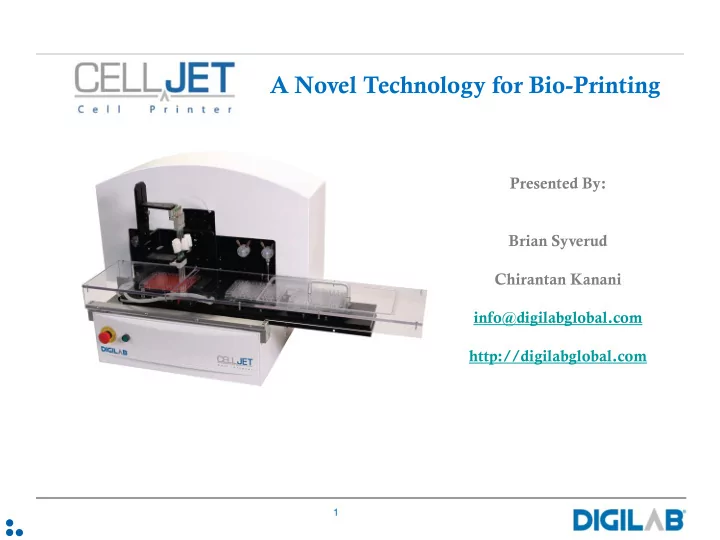

A Novel Technology for Bio-Printing Presented By: Brian Syverud Chirantan Kanani info@digilabglobal.com http://digilabglobal.com 1
Overview • What is the CellJet? Basic Functioning Live Cell Printing • How did we use it? Validation as a tool for Biofabrication • Future Directions 2
Basic Operation 3
System Capabilities • Fast: Fills a 1536 well plate in <1 minute • Flexible Multi-Channel: Separate paths for cells, media, hyrdrogels, etc. 20 nl – 4 µl volume range • Accurate: 10 µm spatial accuracy • Gentle: Non-contact fluid path avoids cell constriction 4
Bio-Printing Validation • Printing Cells Viability Functionality Concentration consistency • Printing Hydrogels Drop dispense at high viscosity 2D Shapes 3D Layering • 3D Construct – cells in hydrogel architecture 5
Cell Viability Human Muscle Stem Cells stained for live/dead assay Scale bar: 200 μ m 6
Cell Viability Human Muscle Stem Cell Viability Smooth Muscle Cell Viability 1 million cells/ml 1 million cells/ml 2 million cells/ml A 100.0 100 Cell Viability (%) Cell Viability (%) 80.0 80 60.0 60 40.0 40 20.0 20 0 0.0 50nl 100nl 250nl 500nl 50 100 250 500 Droplet Volume Droplet Volume (nl) 7
Cell Functionality F-actin staining of Smooth Muscle Cells at 10x Magnification F-actin staining of Smooth Muscle Cells at 20x Magnification 8
Cell Consistency – Fluorescent Dye 100.0 Normalized Intensity 80.0 60.0 40.0 Average Value 20.0 0.0 0 200 400 600 800 1000 1200 1400 Drop Volume (nl) Rhodamine fluorescence intensity as a function of Drop volume after CellJet Printing. 9
Cell Consistency – Rat Arterial Smooth Muscle Cells Cell concentration as a function of Drop volume after CellJet Printing 2000 Expected Value 1500 Cell Count 1000 500 0 0 1000 2000 3000 Drop Volume (nl) 10
Cell Printing Validation • Viability Smooth Muscle Cells 97.5% Human Muscle Stem Cells 98.4% • Functionality F-actin Staining • Consistency Fluorescent Dye Printing ± 4.8% Rat Arterial Smooth Muscle Cells 11
Hydrogel Printing • Sodium Alginate Chemically dependent hydrogel – solidifies with Ca 2+ ions • Drop Dispense at High Viscosities • 2D Shapes Lines Circles • 3D Layering 12
Hydrogels – Drop Dispense • 0.5% w / w Sodium Alginate Viscosity: 58.5 cP Volume Range: 100nl - 4µl • 1.0% w / w Sodium Alginate Viscosity: 269.5 cP Volume Range: 125nl - 4µl • 1.5% w / w Sodium Alginate Viscosity: 1180.2 cP Volume Range: 250nl - 4µl 13
Hydrogels – 2D Shapes • Lines: Average Line Thickness 0.50 Mean: .357 ± .022mm 0.40 Thickness (mm) 0.30 0.20 0.10 0.00 1 2 3 4 5 6 7 8 9 10 Sodium Alginate gel printed to a glass slide Trial 14
Hydrogels – 2D Shapes • Circles: Average Ring Thickness Mean: 1.363 ± 0.129mm 1.50 Thickness (mm) 1.00 0.50 0.00 1 2 3 4 5 6 7 8 9 10 Sodium Alginate printed in 10mm circle Trial Printed Geometry – controlled by Dispense Volume, Height, and Speed 15
Hydrogels – 3D Layering • Sodium Alginate 2D Shapes – Controllable 3D Layering – Unexpected Results • Further Investigation Alternative Dispense Methods Other Hydrogels 16
Future Direction • Print Hydrogels for support • Print Cells suspended in Hydrogel in precise locations 17
Bio-Printing Validation • Printing Cells Viability > 95% Functionality Concentration consistency • Printing Hydrogels In Progress Drop dispense at high viscosity 2D Shapes 3D Layering In Progress • Future Direction – Functional 3D Construct with Cells 18
THANK YOU! Download: http://www.digilabglobal.com/CellJet Email Us: rparker@digilabglobal.com bsyverud@digilabglobal.com ckanani@digilabglobal.com Phone: 508-893-3130 Sample. Science. Solutions. 19
Recommend
More recommend